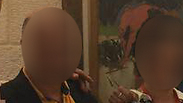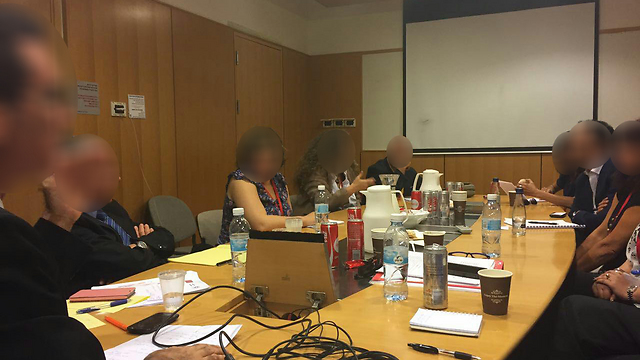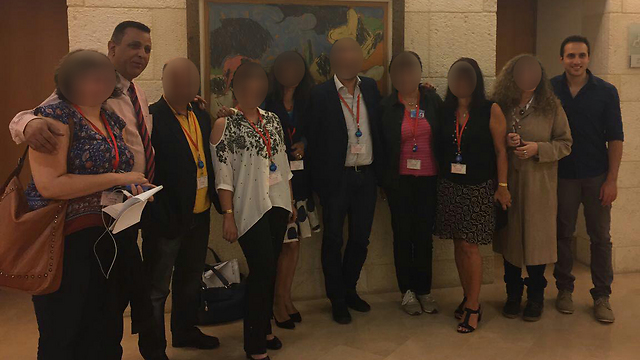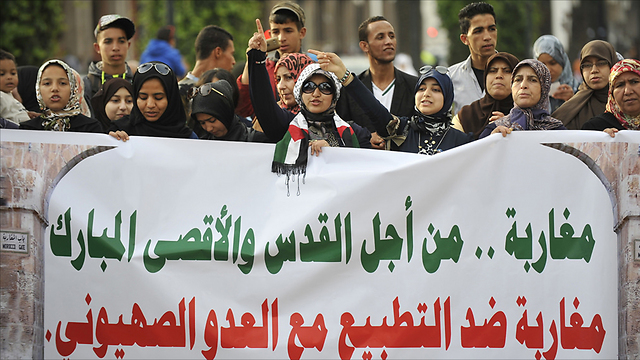
Moroccan delegation of journalists visits Israel, despite intimidation
One of the journalists tells Ynet that showing any kind of support for Israel or even visiting the country can result in ostracization and even death threats: ‘I was afraid of coming...but I wanted to see the Israel that Arab media doesn’t show.’
A delegation of seven leading Moroccan journalists is currently being hosted by the Israeli foreign ministry with the aim of enabling the participants to view first-hand the situation in Israel and to shatter negative myths associated with the country’s image.
As part of the visit which is taking place despite the absence of any official relations between the two counties, the journalists, comprising five women and two men, will receive political and military briefings, meet with ministers, MKs and senior officials from the Supreme Court and will also partake in a tour of the Gaza border.
In a conversation with Ynet, one of the delegation members from a prominent Moroccan newspaper explained the climate of fear and propaganda which has hitherto precluded the possibility of such a visit from coming to fruition.
In 2009, she said, she received an invitation to visit Israel as part of Euro-Mediterranean Youth Forum but felt pressured to decline the offer.
“I was extremely afraid of coming. We are under pressure from the Arab media, religious people and propaganda about the Palestinian issue,” the journalist confessed.
“People are scared to become outcasts. If you say you support Israel, or even that you don’t have a negative opinion about the country in regard to the Palestinian issue, they will single you out.”
In 2010 and 2011, the same journalist received invitations to participate in a conference on counter terrorism in Israel. “For that, of all things, I wanted to come but my manager told me that if I go there he will have the right to fire me because if someone found out that one of our radio journalists visited Israel they would attack us for normalization...This is the thing that scares us in Morocco. It is forbidden to normalize relations with the Israeli enemy and with the Israeli criminal army that robs Palestinians of their land.”
For this member of the delegation, the situation changed in 2013 when she was in the US and she met Jewish Moroccans, one of whom was a young man who had one Israeli grandmother and another Moroccan.
“I told him that I wanted to spread the story among Moroccans in Arabic since the people who oppose Israel speak Arabic and we need to communicate with them in that language,” she continued.
Praising the article as a message of love from a young Jew to Muslims, she described how the piece “evoked great reverberations since this was the first time that a young Jew had ever addressed Muslims in Morocco in Arabic.”
It was this meeting out of which the current delegation tour was born when the same Jewish youngster established the connection with an Arabic media spokesperson in the Foreign Ministry and invited her to come to Israel.
The journalist outlined her reasons for joining the delegation, citing curiosity about the Israel that is not documented in most Arab news sources. “There are people in Morocco who say that there is a difference between Zionism and Jews but it really doesn’t matter. I want to know the Israel that the Arab media does not show us.”
This time accepting the offer, she also described just how hazardous participating in such a trip can actually be.
“I didn’t tell most of my friends that I am coming here so that they wouldn’t ostracize me. As a country, Morocco has no problem with me coming to Israel. As a delegation we flew as usual from Casablanca. No one prevented us from doing so.” However, she noted that “my friends recommended that I don’t share anything on social media. ‘You will regret it for the rest of your life. They will incite against you and you will possibly even get death threats,’” they warned her.



















